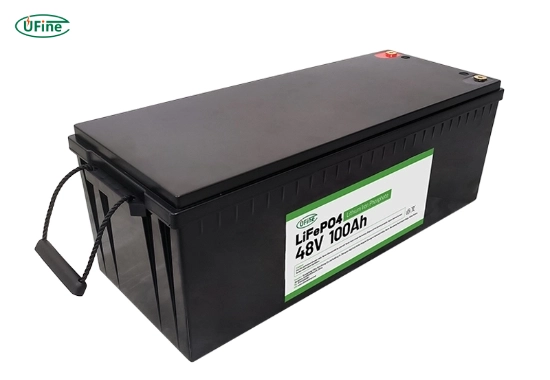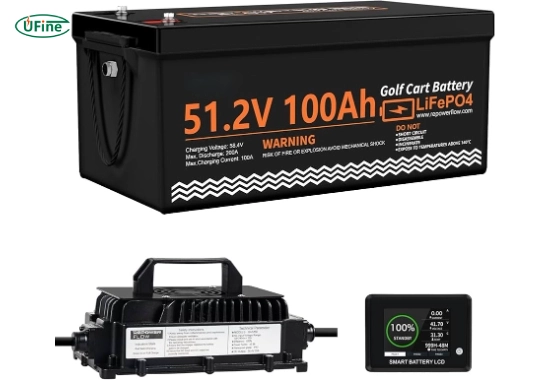
- Part 1. What are 48V golf cart batteries?
- Part 2. What are 51.2V golf cart batteries?
- Part 3. Key differences between 48V and 51.2V golf cart batteries
- Part 4. 48V and 51.2V golf cart battery: performance comparison
- Part 5. 48V and 51.2V golf cart battery:
- lifespan and durability
- Part 6. 48V and 51.2V golf cart battery: maintenance requirements
- Part 7. 48V and 51.2V golf cart battery: cost considerations
- Part 8. 48V and 51.2V golf cart battery: charging times
- Part 9. 48V and 51.2V golf cart battery: compatibility
- Part 10. FAQs
One of the most common questions when considering electric golf carts is the difference between 48V and 51.2V golf cart batteries. Understanding this difference is crucial for making an informed decision about which battery type best suits your needs. Both battery types have unique features, advantages, and disadvantages that can affect performance, lifespan, and overall user experience. This article will explore these differences in detail to help you choose the right battery for your golf cart.
Part 1. What are 48V golf cart batteries?
48V golf cart batteries are commonly used in electric golf carts and other low-speed vehicles. They typically consist of multiple cells connected in series to achieve the desired voltage level. Manufacturers can make these batteries from different chemistries, primarily lead-acid or lithium-ion.
- Lead-acid Batteries : These are the traditional choice for many users due to their lower cost. They consist of lead plates submerged in a sulfuric acid solution. While affordable, they have some drawbacks, such as being heavier and requiring regular maintenance.
- Lithium-Ion Batteries: These batteries are becoming increasingly popular due to their lighter weight and longer lifespan. They use lithium compounds to store energy, making them more efficient than lead-acid batteries.
The 48V system has been a standard choice for years because it balances power output and affordability. However, users should know the maintenance needs associated with lead-acid options.
Part 2. What are 51.2V golf cart batteries?
51.2V golf cart batteries represent a newer option on the market, primarily utilizing lithium iron phosphate (LiFePO4) technology. This chemistry allows for a higher nominal voltage compared to traditional 48V systems.
- Higher Voltage Output: The nominal voltage of 51.2V provides better performance in terms of speed and torque compared to 48V batteries.
- Energy Efficiency: These batteries deliver consistent power output throughout their discharge cycle, making them ideal for users who require reliable performance over extended periods.
Longer Lifespan: With proper care, 51.2V batteries can last significantly longer than their 48V counterparts, making them a worthwhile investment for many users.
Part 3. Key differences between 48V and 51.2V golf cart batteries
Understanding the distinctions between these two battery types is essential for making an informed decision:
| Feature | 48V Battery | 51.2V Battery |
|---|---|---|
| Voltage Output | Standard voltage for many carts | Higher nominal voltage |
| Battery Chemistry | Lead-acid or lithium-ion | Primarily lithium iron phosphate |
| Weight | Heavier (especially lead-acid) | Lighter due to lithium technology |
| Energy Efficiency | Moderate efficiency | Higher efficiency with less energy loss |
| Lifespan | 2-5 years (lead-acid), longer for lithium | Up to 10+ years |
| Maintenance | Requires regular maintenance | Virtually maintenance-free |
| Cost | Lower upfront cost | Higher initial investment |
Part 4. 48V and 51.2V golf cart battery: performance comparison
When comparing performance, the differences in voltage output significantly impact how each battery type operates under load:
- Torque and Speed: The extra voltage provided by a 51.2V battery translates into better torque, making it easier for golf carts to climb hills or carry heavy loads compared to a standard 48V battery.
- Power Delivery: A higher voltage allows for more efficient power delivery, resulting in less current draw for the same power output. This reduces heat generation and improves overall energy efficiency.
Additionally, users often notice that carts equipped with a 51.2V battery system perform better on inclines and can maintain higher speeds over longer distances without quickly losing power.
Part 5. 48V and 51.2V golf cart battery:
lifespan and durability
Lifespan is a critical factor when choosing between these battery types:
- 48V Lead-Acid Batteries: Typically last 2-5 years, depending on usage patterns and maintenance practices. They require regular water checks and terminal cleaning to prevent sulfation.
- 51.2V Lithium-Ion Batteries: These batteries can last over 10 years, and some models offer up to 5,000 charge cycles, making them a more durable choice in the long run.
The difference in lifespan means that while lead-acid batteries may be cheaper initially, they often require replacement sooner than lithium-ion options.
Part 6. 48V and 51.2V golf cart battery: maintenance requirements
Maintenance is another area where these batteries differ significantly:
- Lead-Acid Batteries (48V): Regular checks on water levels and terminal cleaning are required to prevent sulfation and ensure optimal performance.
- Lithium-ion batteries (51.2V): Are sealed units that do not require maintenance beyond occasional inspections, making them much more user-friendly.
This ease of maintenance can be particularly appealing for those who want a hassle-free experience with their golf cart’s power system.
Part 7. 48V and 51.2V golf cart battery: cost considerations
Cost is always a significant factor in any purchase decision:
- Initial Investment: While 48V lead-acid batteries are generally cheaper upfront, their shorter lifespan and higher maintenance costs can lead to more significant expenses.
- Long-Term Value: Although 51.2V lithium-ion batteries have a higher initial cost, their longevity and lower maintenance needs often result in better long-term value.
When deciding between these two options, it’s essential to consider the upfront costs and how much you will spend on replacements and maintenance over time.
Part 8. 48V and 51.2V golf cart battery: charging times
Charging time is essential for users who want minimal downtime:
- 48V Lead-Acid Batteries: Generally take longer to charge due to their chemistry’s limitations; it can take anywhere from six hours or more, depending on the charger used.
- 51.2V Lithium-Ion Batteries: Users can often charge these batteries faster, with some models recharging up to 80% in an hour, allowing for a quicker return to the course or road.
Faster charging times make lithium-ion options particularly attractive for users who frequently use their golf carts throughout the day.
Part 9. 48V and 51.2V golf cart battery: compatibility
Before switching battery types, it’s crucial to consider compatibility:
Most modern golf carts designed for a 48V system can accommodate a 51.2V battery, mainly if they use lithium technology.
However, verifying compatibility with your specific cart model before making any changes is essential since some older models may need to support higher voltage systems more effectively.
Consulting your golf cart manufacturer or dealer can clarify compatibility issues before investing in new batteries.
Part 10. FAQs
-
Can I replace my 48V battery with a 51.2V battery?
Yes! Most modern golf carts can handle this transition if they are compatible with lithium technology. -
What is the main advantage of using a 51.2V battery?
The primary advantage is improved performance due to higher voltage output, leading to better torque and efficiency during operation. -
How often do I need to maintain my lead-acid battery?
You should perform regular checks every few months to ensure adequate water levels and to clean terminals from corrosion or buildup. -
Are there any safety concerns with lithium batteries?
It would help if you handled lithium batteries properly during installation and usage, as they are less likely to overheat or burn than lead-acid batteries. -
Which type of battery is more environmentally friendly?
Lithium-ion batteries generally have less environmental impact over their lifespan than lead-acid options due to lower maintenance needs and longer life cycles.
Related Tags:
More Articles

What are Watts and Watt Hours in Battery?
Understand watt vs watt-hour in batteries, how to calculate battery watt hours, and what Wh means for car batteries, devices, and energy storage.
A Complete Guide to the Best Batteries for Flashlights
Compare the best batteries for flashlights, including AA, AAA, 18650, 21700, CR123A. See which battery offers the best brightness, runtime, and reliability.
How Long Do Rechargeable AA Batteries Last?
How long do rechargeable AA batteries last? Compare NiMH and lithium AA lifespan, recharge cycles, key factors, and performance vs alkaline batteries.
How Much Current Can a 9V Battery Really Supply?
Discover how many amps a 9V battery can supply, its actual current output, discharge rate, and capacity for alkaline, lithium, and rechargeable 9V batteries.
12V STD vs 12V AGM: Meaning, Differences, and Which Is Better
Understand what STD and AGM batteries mean, their key differences, and which 12V battery fits your needs best in 2026.




